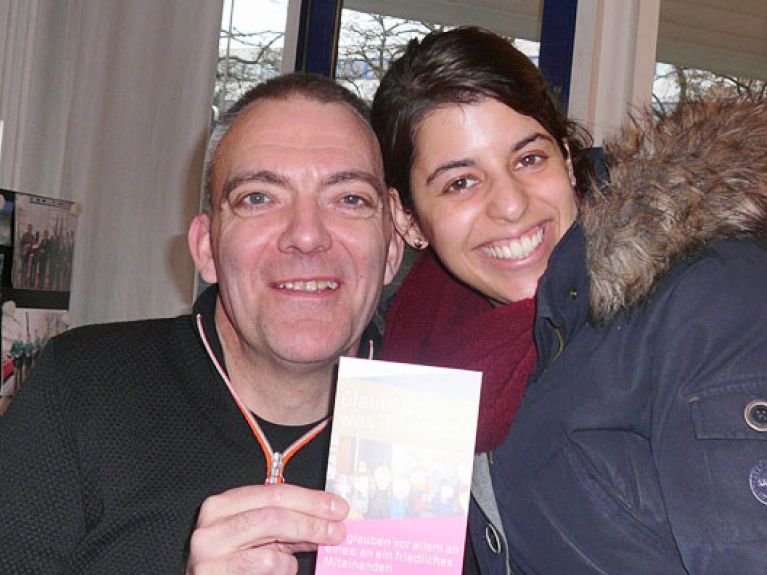“Are you really Jewish?”
Hagar Levin has often heard this question in Berlin. The Israeli does important outreach work for Moslem children and young people with her project Shalom Rollberg.

When Hagar Levin studied the history of the Middle East in Israel she never met people from Arab countries. She only knew Iraq, Syria and Egypt from books, says the 28-year-old Israeli. She came to Berlin in 2012 under the auspices of the German-Israeli volunteer programme Kom-Mit-Nadev – Hebrew for “come volunteer”. It was only during her work there for Morus 14, an association in the Neukölln district of Berlin that promotes education, integration and the prevention of violence, that Hagar Levin got to know Arabs from North Africa and the Middle East. There, in the Rollberg quarter, live 6,000 people from over 30 nations whose roots lie largely in Turkey or the Arab countries. Some 80% of the young people in this district of the German capital come from immigrant families, and most of them are Moslems.
“Life in Rollberg is limited to the extended family,” says Marianne Johannsen, Chairwoman of Morus 14. “The problem for children here is that although they were born in Berlin, they do not go beyond their district. That’s why the association went looking for a volunteer from outside Germany.”
Intern Levin learned German and began working with the children of the Rollberg quarter. She soon discovered that some words in this migrant district had pejorative meanings. “‘Jew’ was an insult for many of the children here. But we only rarely hear it here in Morus 14. Nevertheless, at the beginning many families didn’t talk to me, because they had never met an Israeli before in their lives. Many children found it difficult to believe I’m a Jew. Many parents also didn’t believe that Jews look like ordinary people.”
With her infectious smile and her openness, Hagar Levin gradually gained the trust of those parents who put their children’s education first. To promote that and to enable them to meet Jews, at the end of her internship she founded the project Shalom Rollberg. Together with five Jewish volunteers, she offers educational activities free-of-charge in an English group, art group, theatre group, sports group and a fashion design course. “We have girls with hijab and without,” says Levin. “Fashion interests them all.”
The Israeli art therapist Nehama Bauch has been in charge of the art group since 2014: “I don’t make my origin a topic. But it is normal that children are curious and then I answer their questions. The children then gradually come to trust us.”
Sara El-Jaziri, a 14-year-old who wears a hijab, enthuses about Hagar, who teaches her English. “She’s a great help to students.” El-Jaziri’s mother comes from Syria, her father from Iraq. The family appreciates the free additional tuition. “It’s also very important for other children here who need help, because their families couldn’t pay for it,” says Mrs El-Jaziri.
Chaima is 17 and values the additional tutoring in mathematics that she receives on Mondays and Wednesdays. She was born in Berlin, but her parents come from Algeria. The young woman plays soccer in a women’s team in Neukölln. She prays at the mosque mainly during Ramadan. Chaima emphasises: “There were never problems because Hagar is an Israeli.”
Gilles Duhem, Director of Morus 14, confirms that none of the children or young people have a problem with the Jewish volunteers. The biggest problem he has is getting the youngsters to keep their appointments. Some 40 school students take part in the various courses. “The numbers vary every week because of the non-committal attitude of some of the young people and their parents.” Do the group participants become better students because of the courses offered by Shalom Rollberg? “That’s the illusion of researchers. I’m just happy when they regularly come and exchange views, when they learn to express themselves – also in English – and to form an opinion.”
This kind of broadening of horizons also includes regular guided tours of the New Synagogue in Berlin with Rabbi Daniel Alper to counteract anti-Semitic prejudices. In spring 2016, on the Day of the Basic Law, Hagar Levin was honoured for her Shalom Rollberg project within the framework of the competition Active for Democracy and Tolerance.
Gilles Duhem would definitely like Hagar to continue her project with Moslem migrant children, “because here she is a Jew who you can talk to face to face.” Funding for 2016 comes from the Deutscher Paritätischer Wohlfahrtsverband. But the finance is not secure on a long-term basis. What disappoints Duhem is the lack of willingness on the part of many parents to become association members, although the 25-euro annual membership fee is very low. Very few migrants are among the 230 members of Morus 14. Even if future funding is successfully found, the director will have to learn something new: Hagar Levin is getting married. He still hasn’t learned how to pronounce her new, complicated surname. ▪

